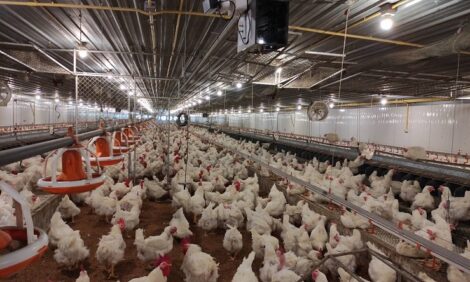



International Egg and Poultry Review
US - By the USDA's Agricultural Marketing Service (AMS). This is a weekly report looking at international developments concerning the poultry industry. This week's report covers the poultry situation and outlook several Asian countries - China, Japan and Thailand.Melamine in Food
China reported high levels of melamine in powdered baby milk and other dairy products in September, 2008, after numerous babies fell ill after ingesting the milk. Reports indicate that over 52,000 children in China became ill, 12,000 have been hospitalized, and several have died as a result of consuming Chinese infant formula made with contaminated milk. The Chinese government responded by setting national standards for levels of the industrial chemical melamine permitted in milk and food products. Levels considered safe were set at 1 milligram per kilogram of infant formula and 2.5 milligrams for liquid milk, milk powder and food products that contain more than 15% milk.
China’s state media reported the industrial chemical melamine is commonly added to animal feed to make it appear higher in protein, even though there are no nutrition benefits to the animal.
In late October Hong Kong authorities found melamine in brown eggs imported from the mainland, the result of contaminated feed given to chickens. The eggs had 4.7 parts per million (ppm) of melamine, about double the legal limit. The legal limit in Hong Kong is 2.5 mg/kg for foodstuffs.
Testing in Japan revealed melamine residues of between 2.8 and 4.6 parts per million in egg products imported from China.
Following reports of tainted egg products in Japan, South Korea started inspecting processed egg products shipped from China. Melamine levels ranging from .01 to 4 ppm were found in products from two manufacturers. The ministry ordered the importers to destroy the remaining 23 tons of egg powder
China is the world’s largest poultry egg producing country. In March, 2008 FAS Beijing (Post) forecast China’s total poultry egg production to increase by two percent to 31.1 MT from an estimated 30.3 MT in 2007. China mainly exports shelled eggs, with 90% going to Hong Kong and Macau.
Thai egg producers could benefit from China’s woes. Hong Kong normally imports 22-23 million eggs a month from Thailand. Between January 2008 and September 2008 Thailand exported 216,271,663 eggs to Hong Kong compared to 168,935,249 eggs for the same period a year earlier. Eggs imported from Thailand are more expensive than eggs from China.
Background: Melamine is a by-product of the coal industry and has numerous industrial uses; it also contains 66% nitrogen by mass. When added to low-quality food and feed, it results in artificially high protein readings. Normal foods contain carbohydrates, fats and proteins. Carbohydrates and fats don’t contain nitrogen, but protein does so most protein tests are looking at nitrogen levels. Products appear to have more protein, which can then be marketed at a higher price.
Extremely high levels of melamine can cause kidney stone or even death. In 2007, melamine was found in wheat gluten and rice protein concentrate exported from China and used in the manufacture of pet food in the United States. In 2007 an estimated 8,500 dogs and cats died of kidney failure after eating melamine contaminated pet food.
Source: Food and Agriculture Organization of the United Nations; World Health Organization; Government of Hong Kong Centre for Food Safety; U.S. Food and Drug Administration; USDA/FAS; Thai Customs Department; news wires
Thai Government Monitoring Melamine in Feed
The Department of Livestock Development (DLD) has banned the use of melamine in feed since August 2007 and actively monitors feed and feed component imports for melamine contamination. The recent detection of melamine in Chinese dairy products and animal feed has raised Thai consumer concern about the safety of meat and egg products.
According to the Thai Bureau of Livestock Standards and Certification office in the Department of Livestock Development (DLD), DLD has been monitoring imported feed for melamine contamination for over a year. On August 3, 2007, DLD banned the importation, production, and sale of all kinds of feed and feed ingredients containing melamine substances.
| The Department of Livestock’s Notification Re: Prohibition of Importation, Production, and Sale of Complete Feed and Feed Ingredients Contaminated with Melamine Substance (Unofficial Translation) |
|---|
|
Since there was a report of damages affected to farmers in the United States and other countries which were caused by the utilization of feed contaminated with Melamine substances, the department, by the authority as described in Section 32 (2) in Feed Quality Control Act B.E. 2525 (1982), in order to prevent damages to Thai farmers, proclaims that: |
DLD has recently proposed a new notification regarding the banning of analogs or derivatives of melamine. DLD anticipates that this notification may be approved by the end of November.
On November 4, 2008, the Deputy Ministry of Agriculture and Director General of DLD released a statement to media regarding the preventive measures the Ministry of Agriculture and Cooperatives have taken to prevent against melamine-tainted feed in Thailand. In addition to the Notification on August 3, 2007, banning the importation, production, and sales of all kinds of feed and feed ingredients contaminated with melamine substances. DLD stated that failure to comply with this regulation (importing, producing, and selling products contaminated with melamine) is subject to penalties.
From 2007 until October 2008, DLD collected and tested 854 samples of imported plant protein products, animal protein products, and dairy products. Ten of samples tested positive for melamine contamination resulting in 608 tons of imported feed products being rejected. In addition, DLD continues to monitor the safety of meat and eggs through random sampling. DLD applies the same tolerance level to be considered melamine-free as the Thai Food and Drug Administration (FDA), which is 1.0 ppm for raw milk and milk powder, and 2.5 ppm for other products.
Source: USDA/FAS Attaché Report
Further Reading
| - | You can view the full report by clicking here. |








